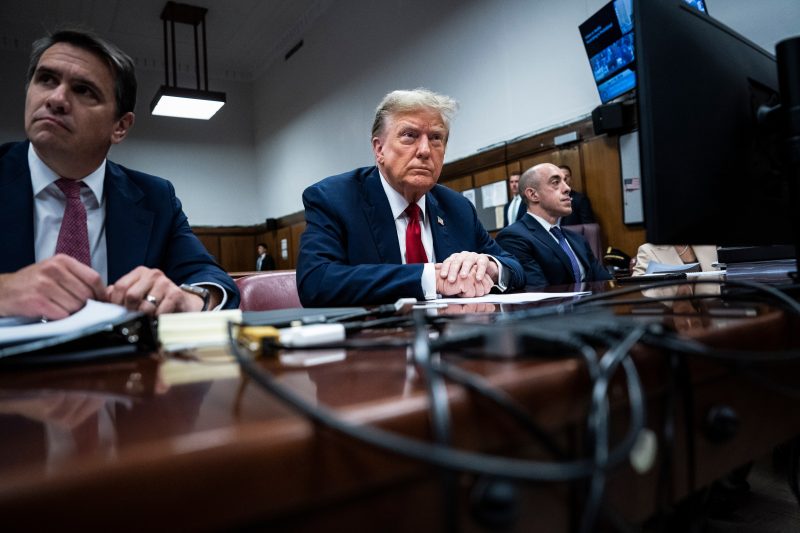
N.Y. trial’s focus on tawdry scandal could underscore Trump’s weakness with women
NEW YORK — Former president Donald Trump and his allies have fought back against the criminal case he faces here by discounting the impact of alleged conduct that happened years ago and charges that center on the seemingly tedious subject of business records.
But the last flurry of motions before jury selection began Monday showed that prosecutors plan to lay out a different kind of story, one that has much more in common with the tabloid fodder that fueled Trump’s fame and revisits the “Access Hollywood” scandal that was a low point during the final weeks of the 2016 election he went on to win. That framing could scramble expectations about the salience of this trial for voters considering whether to return Trump to the White House in November.
“With these trials, there’s the 12-person jury, and then there’s 120 million Americans that are gonna vote that form their own jury on this,” said Jim Kessler, executive vice president of policy for Third Way, a center-left policy group in Washington. “It’s like, ‘Oh yeah, he’s that guy. I forgot about the porn star.’ … You could see women saying, ‘Here’s another reminder why I don’t like him.’”
Facing 88 criminal charges across four indictments, including allegations of interfering with the 2020 election results and mishandling classified documents, Trump successfully used his legal problems as a rallying cry in the Republican primary. In the general election, it is far less clear how they will affect voters’ attitudes.
Many strategists view the New York case as the least damaging proceeding against Trump and are skeptical that further attention to his character will move the dial for voters already willing to look past “Access Hollywood” and more. But the sordid details of the Manhattan trial will train public attention on allegations that could matter at the margins.
Manhattan District Attorney Alvin Bragg’s team said they wanted to play the recording of Trump making lewd remarks about groping women on the set of “Access Hollywood.” They pushed to reference the women who came forward after the tape’s disclosure to accuse Trump of sexual misconduct. Prosecutors also said they wanted to describe a previous hush money scheme with a Playboy model, Karen McDougal, and to specify that during that alleged encounter, Trump’s wife was pregnant.
The judge, Juan Merchan, did not agree to allow all that evidence, saying he had to balance what was relevant to the charges and what was too prejudicial. The jurors could see a transcript of the “Access Hollywood” tape but not hear the tape itself. Prosecutors could mention the affair with the Playboy model, but Melania Trump’s pregnancy was out of bounds.
Still, the motions indicated how prosecutors plan to explain Trump’s motivation for paying hush money to adult-film actress Stormy Daniels before the 2016 election. The prosecutors appear poised to argue that Trump’s campaign was reeling from the “Access Hollywood” tape, with many Republicans deserting him and condemning his behavior, and he couldn’t afford another damaging revelation about an alleged tawdry affair.
Trump has denied the affair. One of his lawyers, Will Scharf, said in an interview on Monday with CNN’s Jake Tapper that the jury would have to decide whether it was false for the hush money payments through lawyer Michael Cohen to be recorded as a legal retainer.
Trump “became almost obsessed with addressing these allegations,” Assistant District Attorney Joshua Steinglass said while arguing to include other sexual misconduct allegations against Trump, which Merchan denied. “This is really the key, specifically with female voters.”
Pollsters have asked Americans how a potential conviction would affect their vote, but such hypothetical questions are often not predictive. Trials can have unexpected twists. Trump will have his turn to respond. A New York Times/Siena poll this month found that 37 percent of registered voters said they were paying little to no attention to this case.
But 58 percent of voters — including a majority of independents — said they view the charges as very serious or somewhat serious.
“He stayed together with his wife,” said Martha Zoller, a conservative talk show host in Georgia who voted for Nikki Haley in the Republican primary and argued that rehashing allegations from so many years ago will matter little to voters. “It just seems like an unnecessary case. … And I’m not a person that loves Trump.”
Views of the New York charges echoed a gender gap in support for Trump and President Biden. Forty percent of women called them very serious, compared with 20 percent of men, according to the New York Times/Siena poll, which also found Biden leading with women by 16 points — and Trump leading with men by 20.
Concerns about Trump’s polling with women also resurfaced after a jury found him liable last year for sexually abusing writer E. Jean Carroll and defaming her. In January, Carroll won an additional $83.3 million after Trump defamed her again.
Gunner Ramer, the political director of Republican Voters Against Trump, said Monday that their focus groups suggest Trump’s other criminal cases are more meaningful to swing voters than the New York case.
“We run through each indictment, and we ask them which one matters to you most,” Ramer said. “And this is never the one that matters to them most.”
Voters already know that Trump is “not some highly moral human being,” Ramer added, though he views Trump’s overall legal woes as potentially impactful with the “double haters” who dislike both Trump and Biden.
On Monday, Merchan also agreed to let prosecutors introduce evidence about a meeting at Trump Tower where a National Enquirer editor allegedly agreed to help suppress negative stories about Trump and publish negative stories about his rivals.
“The entire point of the Trump Tower meeting was to control the flow of information that reached the electorate to accentuate the positive, hide the negative and exaggerate information that would be harmful to Trump’s opponents,” Steinglass said.
Trump lawyer Todd Blanche argued that the editor’s meeting with Trump and Cohen did not show evidence of misconduct and that meetings like that are common for candidates. Merchan said the details of the meeting would be admissible as evidence of prior bad conduct that may help the jury decide whether Trump intended to commit a crime when he concealed his reimbursement payments to Cohen, who directly paid off Daniels.
Knowles reported from Washington.
